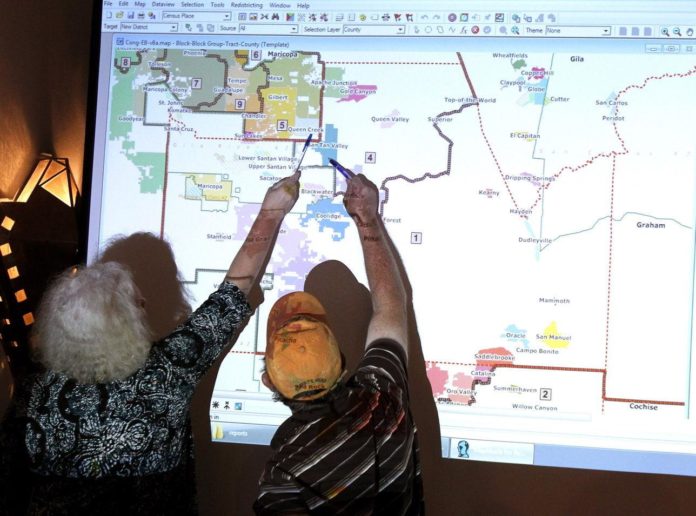
A top staffer for Phoenix City Councilman Jim Waring has been chosen to be the executive director of the commission that will redraw Arizona’s political district lines this year.
The five-member commission chose Brian Schmitt for the job after interviewing five finalists in a day-long session Tuesday.
The 3-2 vote to hire Schmitt, who was linked to Republican campaigns last year and in 2018, was opposed by the two Democratic members of the commission.
But in his interview, Schmitt said he had been asked “as kind of a one-off” to help organize last year’s traditional Republican campaign finale at the Yavapai County Courthouse in Prescott. Federal records from former Sen. Martha McSally’s campaign showed he received a payment of more than $63,000 three days after the Nov. 3, 2020, general election.
He said his job as chief of staff to Waring, a Republican, requires him to do non-partisan staff work in support of an elected official, which is the primary role of the executive director.
“He understands the chief of staff role,” Republican Commissioner David Mehl said during a discussion of the candidates. “I was very impressed with him.”
The executive director oversees staff and advises commissioners on choices for attorneys and mapping consultants the panel will choose as it gears up for the politically charged job of redrawing Arizona’s congressional and legislative maps for the coming decade.
The process was expected to start this spring, but the U.S. Census Bureau announced last month that it will not be able to deliver needed data from the 2020 Census until late September. That means the commission can’t begin drawing new maps until early October, and it must complete the job by early 2022.
The redistricting commission was created by voters to limit political influence by the Legislature in redrawing congressional and legislative district maps. The process that follows each U.S. Census is politically important because redrawn district lines can limit how many legislative and U.S. House seats each party can realistically win.
The commission has five members — two Democrats, two Republicans, and an independent who serves as chair. The partisan members are chosen by legislative leaders and the chair from a list created by a judicial appointment panel. The chair often acts as a tiebreaking vote.
Under the constitutional amendment approved by voters in 2000, the redistricting commission must consider population, voting rights, geographic features, communities of interest, and competitiveness when drawing new districts.
Republicans generally liked the district maps drawn after the 2000 Census, and those done following the 2010 Census were regarded as more favorable to Democrats, prompting strong criticism from Republicans.
The 2001 and 2011 maps led to prolonged court challenges, including a 2015 U.S. Supreme Court decision that upheld Arizona voters’ decision to strip the redistricting process from the Legislature.
The independent chair, Erika Neuberg, said she was very satisfied that Schmitt will serve the commission without partisan bias. She noted that Schmitt will not have a vote and is there to support the commissioner.
“I’m very comfortable with this choice, and that we collectively commit to the entire state that this will be a process of transparency, legitimacy, and diversity,” Neuberg said.
Republished with the permission of the Associated Press.













